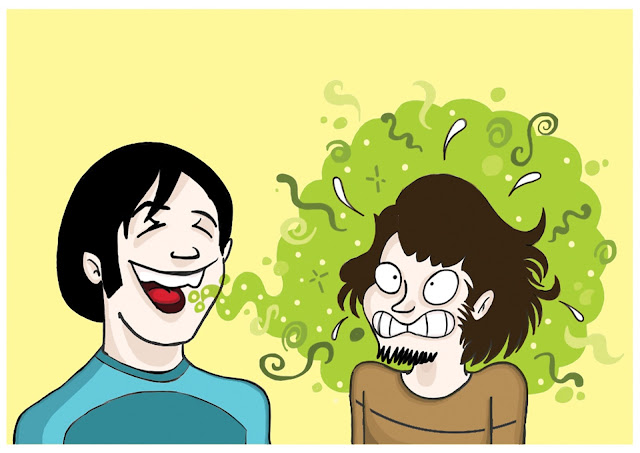Bad breath is medically referred to as halitosis and most often arises from bad oral hygiene. The condition can be affected by your daily lifestyle and especially the food you eat.
Table of contents
The Causes of Halitosis
There are about more than 40 causes for bad breath identified by researchers. We already know that poor oral hygiene is an aggravating factor for the problem, as it allows food scraps to accumulate between the teeth, tongue, and gums. These food residues cause bacteria that already exist naturally in the mouth to dissolve food particles and thus release substances with a strong odor.
lingual saburra is another factor that causes halitosis, a yellowish-white layer that deposits on the surface of the tongue. This layer is consisting of scraps of food, bacteria and scaly cells from the mouth. What makes it a problem is when it accumulates and stays at the bottom of the tongue. The bacteria present there will take advantage of the food waste and, during this process will release sulfur, a gas of intense smell.
Bacterial plaque which forms naturally in the mouth is another condition that contributes to bad breath. Hence the need to remove it frequently with brushing and flossing. Other problems affecting the gums and teeth, such as periodontitis, also cause halitosis.
Dry mouth. This is one of the contributing factors to bad breath: It is known that saliva helps in the removal of particles and residues in the mouth. A condition in which the salivary glands in your mouth don’t make enough saliva to keep your mouth wet. This situation can be caused by the use of some medicines, cigarettes and even the fact of sleeping with the mouth open.
How to overcome bad breath
Change the brush periodically.
As careful as you can, handle your toothbrush, of course leaving it in the bathroom makes it the target of hundreds of bacteria that lodge in this room. Experts in the oral care recommend changing it every two or three months. It is important that if you have had cold or strep throat, replace the brush, just to curb bring into your mouth infectious bacteria that can cause you to have a relapse.
Mouth rinses and toothpastes.
If your bad breath is due to a buildup of bacteria (plaque) on your teeth, your dentist may recommend a mouth rinse that kills the bacteria. Your dentist may also recommend a toothpaste that contains an antibacterial agent to kill the bacteria that cause plaque buildup.
Drink plenty of water
When we wake up, it is very likely that the so-called morning breath will usually occur. Do you think you have a stronger breath in the morning? This is due to the lower production of saliva at night, saliva contains oxygen which is able to decrease the production of bacteria in the mouth.
However, this so-called morning breath can occur at other times of the day, be it morning, afternoon or night. Your mouth can get quite dry throughout the day as well, resulting in less saliva production. Consequently, the breath can become much stronger. The simplest recommendation is to drink plenty of fluids to keep the region constantly moist.
Quit Smoking
This is no secret: smoking is a major cause of bad breath. In addition to cigarettes releasing various chemicals that harm the body, they can cause serious problems to the teeth and gums. Smokers are more susceptible to plaque formation, which also help in the proliferation of halitosis
The basics: Toothbrush and Dental floss
The mouth contains millions of bacteria, with hundreds of types living in the area. To be aware, scientists have studied less than half of the bacteria that live in our mouths. There are two very common methods of eliminating these germs (which we all know well): Brush your teeth at least twice and floss daily.
Yes, dental floss is extremely important in eliminating small blocks of food.
The food we eat is the food that bacteria also eat, so the fewer traces in our mouths, the more difficult it is for bacteria to proliferate. Oral rinses are important as well, but they do not replace brushing and flossing – remember that.
Cleaning the tongue and tonsils
The tongue also contains several types of bacteria, and many people often forget to clean this region that is so essential. With tongue cleaners or brushes that have a wiper surface on the opposite side of the bristles. You can use it on the tongue and at the same time wipe the cheek walls inside to eliminate any trace of microbes or bacteria that cause bad breath.
The lingual flab, originating from the combination of cells, saliva and bacteria, is one of the main causes of halitosis and should therefore be tackled with daily cleaning of the tongue. In addition to the lingual flap, it is important to be aware of the causes, which are small white blocks that form and are trapped in the tonsils, causing a very unpleasant odor.
Usually they are expelled through coughing or sneezing, however you can take them out manually as well.

